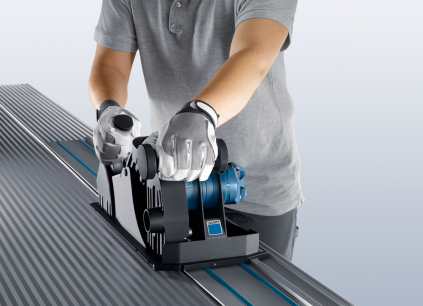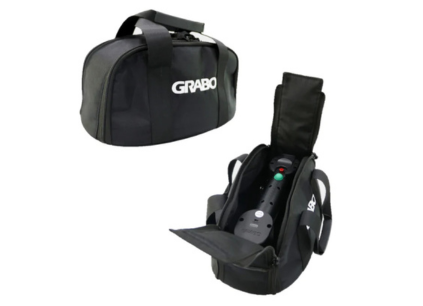At Cladding Mate, worksite safety is our top concern. We proudly offer the industry's best power tools and vacuum lifters. And we take every measure to ensure their safe use. When operating work equipment, including those available from our website, it is important to always abide by the many health and safety regulations. These regulations are designed to keep you and your employees safe.
This guide will cover two of the main pieces of work equipment safety regulations - PUWER and LOLER. These regulations cover operation, maintenance and training.
Provision and Use of Work Equipment Regulations 1998 (PUWER)
People or companies which own, operate, or have control over work equipment must do so in line with the Provision and Use of Work Equipment Regulations 1998 (PUWER). PUWER regulations place a series of duties on work equipment owners and operators. It covers areas such as equipment inspections and maintenance, and training.
PUWER is designed to ensure equipment being used is suitable, safe for use, and only used by those appropriately trained to do so safely.
Work Equipment Inspections
PUWER requires work equipment inspections to identify whether work equipment can be safely operated. Quick visual checks before use are often sufficient, provided the appropriate thorough inspections have been made within the required time frames. More exact inspection requirements and frequencies can be determined through risk assessments.
As well as making inspections at suitable intervals, inspections are required when equipment experiences major modifications, suspected serious damage, or other exceptional circumstances. If the installation conditions may affect the safety of the equipment, it must be inspected before the first use after installation or reinstallation.
Equipment which requires inspection should only be used if the appropriate inspections have been made. Physical evidence of the latest inspections, such as an inspection report or suitable tagging or labelling system, should be provided. You should keep and securely store records of work equipment inspections.
Work Equipment Maintenance
It is important that all of your equipment is in full working order. Faults must be put right to reduce risks and prevent harm. Work equipment maintenance may be part of a routine schedule though it may also be required at short notice for breakdown and accidental damage.
Implementing a regular maintenance plan makes it easier to identify and remedy issues early before they worsen and pose an increased risk to health. PUWER requires all work equipment to be maintained and in good repair. It also requires maintenance logs to be kept up to date. Employers who provide work equipment must have procedures to ensure equipment is maintained and in safe condition.
Did you know… To help ensure your equipment runs optimally and can be put back in working order if it is damaged, we offer warranties across our ranges. We pre-register all of our TruTool power tools with Trumpf giving you access to an extended 5-year warranty. Plus, our Grabo lifters also come with a 1-year warranty.
Work Equipment Training
To maintain safety whilst using, managing or supervising work equipment, they should only be used by someone with the appropriate training. Some activities will require specialised formal training. Many work activities, however, can be carried out with in-house training following the guidance of the manufacturer's instructions and relevant background knowledge, skills, and experience.
Did you know… we have a 20,000ft² warehouse and workshop where we deliver vacuum lifter demonstrations and training. We also provide free online vacuum lifter training through our 4 Cladding Services brand.
Lifting Operations and Lifting Equipment Regulations 1998 (LOLER)
The rules surrounding the use of vacuum lifters are covered in the Lifting Operations and Lifting Equipment Regulations 1998 (LOLER). The LOLER regulations identify the duties of individuals and companies that own, operate, or otherwise control lifting equipment.
Much of the equipment which falls under the LOLER regulations will also be considered work equipment and, therefore, also subject to the PUWER regulations outlined above.
Lifting Planning and Supervision
LOLER regulations dictate that work involving lifting equipment is planned properly by sufficiently competent people. Furthermore, the work must be supervised to ensure it is carried out safely.
When planning lifting operations, you should identify and assess risks. The scope of the planning will differ depending on the job. Simple and commonplace lifting operations may require less planning than more complex tasks. The complexity and difficulty of a lifting operation should be reflected in its planning. A key goal of this planning phase is to identify the appropriate lifting equipment for the task.
LOLER Testing
The condition of your lifting equipment is fundamental to maintaining safety standards on site. LOLER regulations require lifting equipment to be thoroughly examined before use, where installation is required at another site. Equipment must also be inspected when it is exposed to conditions which may cause deterioration liable to result in danger. Pre-use LOLER inspections may not be required if the equipment has a valid Declaration of Conformity from within the last year.
Did you know… We provide LOLER testing as part of our vacuum lifter servicing under our 4 Cladding Services brand.
Other Workplace Safety Regulations
Much of the legal requirements for safely operating workplace equipment, such as the sheet metal cutting tools and vacuum lifters we supply, are covered in PUWER and LOLER regulations. However, you can find further details on your duties in various other regulations. Other regulations addressing the safe use of workplace equipment include;
- Health And Safety At Work Act
- Management Of Health And Safety At Work Regulations
- Personal Protective Equipment At Work Regulations
- Supply Of Machinery (Safety) Regulations
Buy Trumpf Power Tools and More
At Cladding Mate, we are proud to provide the best power tools and lifting equipment on the market. We supply industry-recognised brands, including Trumpf and Grabo. Our team of industry experts is dedicated to saving you time and money while maintaining the highest safety standards. To learn more, explore our range of Trumpf power tools and Grabo vacuum lifters, or get in touch to discuss your requirements.
Power Tool Safety Regulations FAQs
What should work equipment inspections cover?
Work equipment inspections can vary in scope. They range from simple pre-use checks and weekly inspections to extensive, thorough examinations. You can determine the needs of your equipment through a risk assessment. It is also useful to consult manufacturer recommendations and other published health and safety advice from trade associations.
Do all pre-use checks need to be recorded?
Whilst detailed inspections of work equipment should be recorded, this is not typically required for simple pre-use checks.
Who can carry out equipment maintenance
Equipment maintenance should only be conducted by a competent person who has received the necessary training. In cases where the equipment is complex, it is often best for the maintenance to be carried out by the manufacturer or a specialist contractor.


